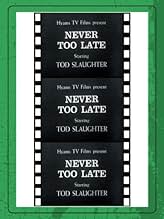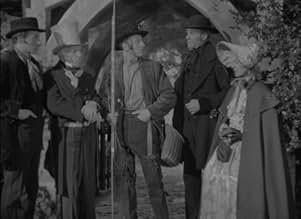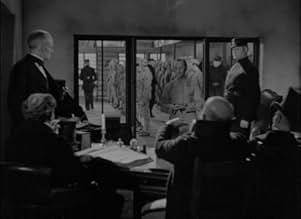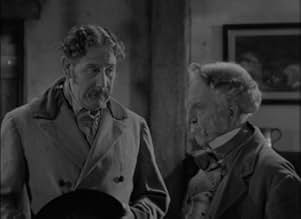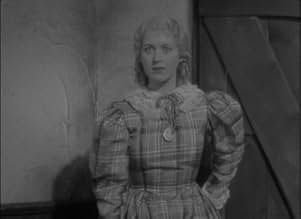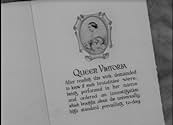Adicionar um enredo no seu idiomaAn evil prison administrator cruelly abuses the inmates at his prison, until one day the tables are turned.An evil prison administrator cruelly abuses the inmates at his prison, until one day the tables are turned.An evil prison administrator cruelly abuses the inmates at his prison, until one day the tables are turned.
- Direção
- Roteiristas
- Artistas
John Singer
- Matthew Josephs
- (as Johnny Singer)
Cecil Bevan
- Prison Inspector
- (não creditado)
Leonard Sharp
- Henry Bradshaw
- (não creditado)
Douglas Stewart
- Prison Inspector
- (não creditado)
Mavis Villiers
- Betty
- (não creditado)
Jack Vyvyan
- Innkeeper
- (não creditado)
Avaliações em destaque
ITS NEVER TO LATE TO MEND is the most traditional of Tod's revived melodramas. It has all the elements and archetypes we expect from the genre. Tod is his usual villainous Squire self. His often comical facial features are better suited to being bewhiskered and having a bushy moustache to twiddle menacingly. As ever, he has his lecherous eye on a virtuous local maiden - Susan, daughter of Farmer Merton. She seeks the penurious local tenant farmer George Fielding (Meadows, Fielding, a slimy solicitor who aid's Tod's schemes called Crawley - the names are not exactly subtle). Tod must be the only wealthy bastard in cinema who never attracts women! But after a failed attempt to convict George for poaching, the young man leaves the country to seek his fortune Down Under. The opening titles reveal Charles Reade's and Queen Victoria's roles in prison reform and it is in the scenes where Tod visits the local gaol in his capacity of Justice of the Peace that we get to enjoy the full magnitude of his hammy villainy. His inspection of the ranks of his "naughty children" and his mocking remarks are a sadistic joy and one can imagine the audience at the Elephant and Castle theatre chuckling along as he speaks. Black comedy is also present in the Uriah Heep-like performance of one convict who makes a great show of demonstrating his penitence but, we see later, has stolen something from the Governor's office. However, the treatment of the 15-year old convict is genuinely disturbing as is John Singer's anguished breakdown.
The tension is diffused by the lack of a strong protagonist for the Squire. George Fielding is sidelined in Australia for the bulk of the narrative - returning only for the climax. The Prison Chaplain provides only token resistance to Tod's reign of terror at the gaol but appears like the 7th cavalry at the end. The main adversary is local poacher Tom Robinson - gallantly taking the blame instead of George for Tod's trumped-up poaching charge. Tom's decline from the jaunty, confident rogue of the opening scenes to a shell of his former self in prison is quite chilling, but the spiritual comfort the Chaplain lends him means a reversion to his old self.
Tom thwarts Meadows' attempts to steal George's newfound fortune. As with MARIA MARTEN, Tod has an alarming tendency to go insane at the inopportune moments - usually while holding his enemies at gunpoint as occurs here at the climax His raving madness as he is led away is genuinely alarming and the closing shot is of him relentlessly repeating the films's title as he works away on the "wheel".
The tension is diffused by the lack of a strong protagonist for the Squire. George Fielding is sidelined in Australia for the bulk of the narrative - returning only for the climax. The Prison Chaplain provides only token resistance to Tod's reign of terror at the gaol but appears like the 7th cavalry at the end. The main adversary is local poacher Tom Robinson - gallantly taking the blame instead of George for Tod's trumped-up poaching charge. Tom's decline from the jaunty, confident rogue of the opening scenes to a shell of his former self in prison is quite chilling, but the spiritual comfort the Chaplain lends him means a reversion to his old self.
Tom thwarts Meadows' attempts to steal George's newfound fortune. As with MARIA MARTEN, Tod has an alarming tendency to go insane at the inopportune moments - usually while holding his enemies at gunpoint as occurs here at the climax His raving madness as he is led away is genuinely alarming and the closing shot is of him relentlessly repeating the films's title as he works away on the "wheel".
How can something be original yet old hat at the same time? It's just another Tod Slaughter film, produced by George "Quota-Quickie"-King back in the 1930's/1880's. Slaughter was a unique talent, during his lifetime never out of work but if remembered at all today by the critical Artheads, ridiculed. Well it's their loss so nothing to worry about, but for people with open minds I recommend watching some his films for something probably completely different from their experience. He has been the only true barnstorming melodramatic actor in the movies, with plenty of intentional and unintentional copycats but no one bettering him, as much of a one-off for example as Jimi Hendrix was. His films were a heady brew of over-the-top and hackneyed melodrama deliciously and lovingly hammed up by the entire cast, especially the usually Machiavellian Slaughter.
Slaughter is the evil leering moustache-twirling Squire machinating for the affections, or marriage and what comes afterwards anyway, of the local farmer's innocent curly-haired daughter. She loves a staunch young true blue Englishman with a square chin and the game is on for the Squire to remove any opposition to his nefarious scheming. On the way a true blue English poacher is sent to prison and boy does he Mend! The descriptions of harsh prison life by the author Charles Reade, and Dickens too of course, pricked a few consciences and woke up the Victorian capitalist class to the wasting of their unearned money on unnecessary and expensive torturing of the inmates of such places. They thought to save money by not turning prisons into sadistic death camps and as a by product saving the miscreant's body as well as soul. One day our lovely modern prisons will have hardly any warders at all, mainly robots and computers looking mechanically over the few people who've done something bad enough to get locked up.
My normally cynical daughter remembered to boo and hiss in the right places, and we cheered at the sudden denouement when all the dark clouds rolled if not flew by. It's not compulsory but it can help get in the right frame of mind while watching this cheap but genuinely lovingly-crafted Victorianesque adaptation of the famous Victorian novel.
Slaughter is the evil leering moustache-twirling Squire machinating for the affections, or marriage and what comes afterwards anyway, of the local farmer's innocent curly-haired daughter. She loves a staunch young true blue Englishman with a square chin and the game is on for the Squire to remove any opposition to his nefarious scheming. On the way a true blue English poacher is sent to prison and boy does he Mend! The descriptions of harsh prison life by the author Charles Reade, and Dickens too of course, pricked a few consciences and woke up the Victorian capitalist class to the wasting of their unearned money on unnecessary and expensive torturing of the inmates of such places. They thought to save money by not turning prisons into sadistic death camps and as a by product saving the miscreant's body as well as soul. One day our lovely modern prisons will have hardly any warders at all, mainly robots and computers looking mechanically over the few people who've done something bad enough to get locked up.
My normally cynical daughter remembered to boo and hiss in the right places, and we cheered at the sudden denouement when all the dark clouds rolled if not flew by. It's not compulsory but it can help get in the right frame of mind while watching this cheap but genuinely lovingly-crafted Victorianesque adaptation of the famous Victorian novel.
If you are looking for subtlety, then I suggest you look elsewhere. However, if you don't mind watching an uneven but enjoyably silly film, then "Never Too Late to Mend" is right up your alley! The film's plot is bizarrely entertaining and downright ridiculous at the same time! The film begins about the year 1840. Squire Meadows is intent on marrying Susan—the trouble is that she already loves another, George Fielding. So what is this good Justice of the Peace to do—he'll scheme, steal and even kill to have Susan! And, through most of the film he does just that. It's all VERY florid and silly but entertaining at the same time. Some of the most ludicrous of these scenes are in the prison that the Squire runs—which is like a house of horrors.
The bottom line is that if you want a realistic or well made film, then this is not it. No, it's silly from start to finish but oddly satisfying. Worth seeing just because it's so bad and doesn't even try to be better!
The bottom line is that if you want a realistic or well made film, then this is not it. No, it's silly from start to finish but oddly satisfying. Worth seeing just because it's so bad and doesn't even try to be better!
Never Too Late (1937)
** 1/2 (out of 4)
Insane, over the top and sometimes hilarious Tod Slaughter movie. Slaughter plays a psychotic Justice of the Peace who falls in love with a farmer's daughter but she wants nothing to do with him. She's in love with another guy but Slaughter will go to all ends to make sure they don't marry. Slaughter has the nickname "The British Bela Lugosi" due to his over the top performances but I personally find this an insult to Lugosi and American horror films. Lugosi went over the top quite a bit but never in the way Slaughter does, which makes his films watchable but also hurts them. His over the top style kills the melodrama in the film but it helps the campy horror side. The highlight of the film has to be the prison torture stuff because it's just so damn funny due to Slaughter's wildness.
** 1/2 (out of 4)
Insane, over the top and sometimes hilarious Tod Slaughter movie. Slaughter plays a psychotic Justice of the Peace who falls in love with a farmer's daughter but she wants nothing to do with him. She's in love with another guy but Slaughter will go to all ends to make sure they don't marry. Slaughter has the nickname "The British Bela Lugosi" due to his over the top performances but I personally find this an insult to Lugosi and American horror films. Lugosi went over the top quite a bit but never in the way Slaughter does, which makes his films watchable but also hurts them. His over the top style kills the melodrama in the film but it helps the campy horror side. The highlight of the film has to be the prison torture stuff because it's just so damn funny due to Slaughter's wildness.
This is an underrated portrait of the Victorian prison system and the chaplain who tried to change it. An evil squire(Tod Slaughter) sends an innocent man to the British version of Alcatraz in order to get his filthy mitts on a beautiful girl. The cinematography is what makes this film so memorable. The effective use of light and shadow to accentuate the misery and suffering of the inmates, many of which are victims of a corrupt system, foreshadows a style utilized in many venerable products of English postwar cinema such as David Lean's Oliver Twist(1948) Some modern critics have panned this and many other Tod Slaughter films due to the melodramatic, stagey acting. While films like The Demon Barber of Fleet Street(1936) barely hold up today, Never Too Late is the exception because it is well-acted and photographed and is relevant to the global problem of human rights abuses that in these supposedly progressive times has still to be wiped out. After viewing this, I can see why Queen Victoria passed so many prison reform bills after seeing this story done on stage.
Você sabia?
- ConexõesFeatured in Doom Asylum (1988)
Principais escolhas
Faça login para avaliar e ver a lista de recomendações personalizadas
Detalhes
- Tempo de duração
- 1 h 10 min(70 min)
- Cor
- Proporção
- 1.37 : 1
Contribua para esta página
Sugerir uma alteração ou adicionar conteúdo ausente

